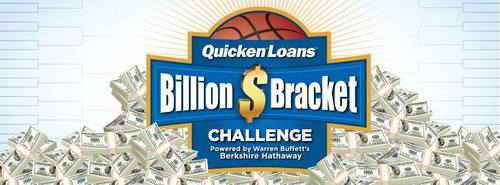A Chicago trader recently won a football prediction contest for $557,850 and gave half of the prize money to Givewell. By induction, if you’re one of my many hyper-analytic friends who think Givewell is cool, you’re probably better than average at prediction too.
Maybe you should take a shot at the upcoming $1B basketball bracket prize. $2M in guaranteed prizes for the best 20 brackets as well.









4 Responses to “$1 Billion Grand Prize for Perfect College Basketball Bracket”
January 23
Alexei AndreevWhat’s the EV if I guess randomly?
January 23
Louie Helm1 in 2^63. Or 1 in 9.2 quadrillion.
January 23
Louie HelmSo don’t forget to use your 40-50 bits of cognitive optimization pressure!
January 23
Patrick LaVictoireIt’s a bit better than that if you don’t pick too many upsets. Using Nate Silver’s odds from last year’s tournament (as a proxy, not as gospel), there was about a 1-in-10,000 chance that the Round of 64 would have no upsets. Later rounds (and play-in games) have more parity, so my guess is that the real chance of the tournament going “all chalk” is something like 10^(-13 ± 2).
Interesting deductions from this:
1. Since the contest is limited to 10 million entries, the chance of having to pay out the $1 billion is less than 1 in 10,000 even on the most pessimistic (to the insurer) assumptions.
2. Since you’d prefer not to split the prize too many ways, the optimal strategy is probably to pick in a weighted random manner such that you get a bracket that is at least the 10 millionth most likely bracket. (Taking into account the fact that most players won’t play in this manner, actually, make that the millionth or even less.) That means picking 5 upsets or fewer (depending on the degree of the upset), but picking them randomly rather than in ways that make narrative sense (and are thus likely to be duplicated by others). For instance, if I pick exactly 3 upsets for the whole tournament, there are ~50k possible ways to do it, and it only gives me an odds penalty of something like 10:1 relative to “all chalk”. Presuming that you don’t end up splitting the prize, then, the expected cash from such an entry is… 10^(-5) dollars.
3. Ergo, spending time on this goes in the category of “fun, with a lottery ticket for your altruism” rather than “effective altruism”.
Let me know if my numbers are meaningfully wrong!